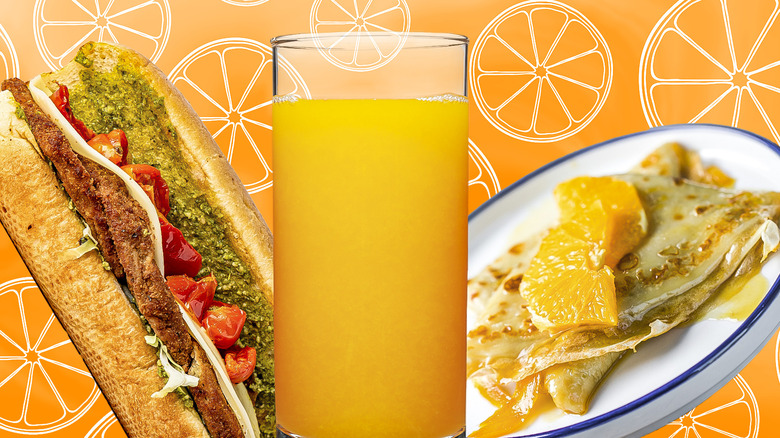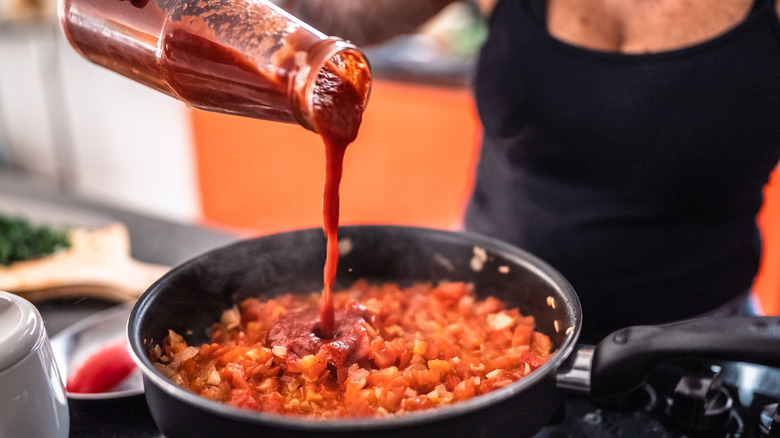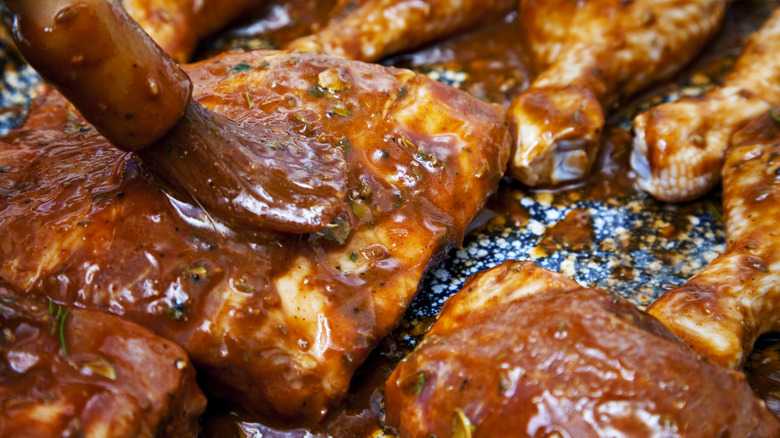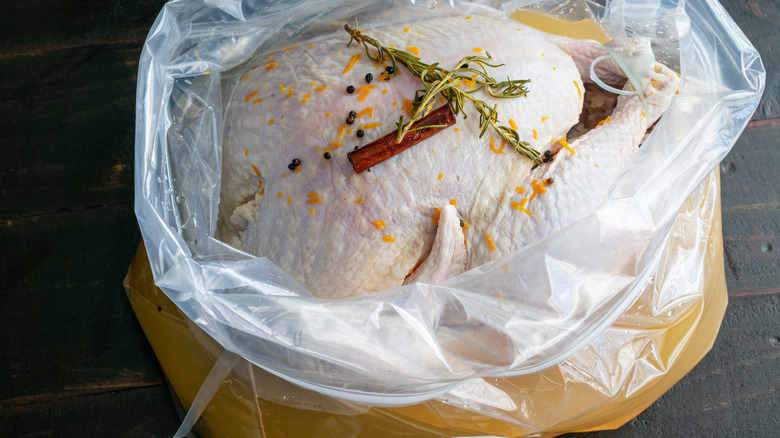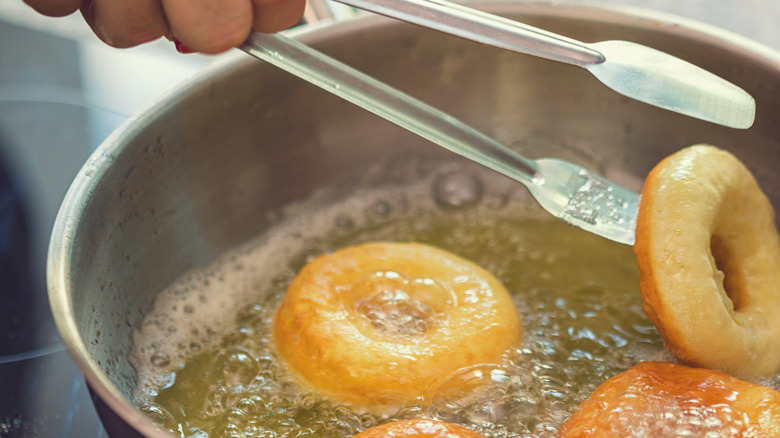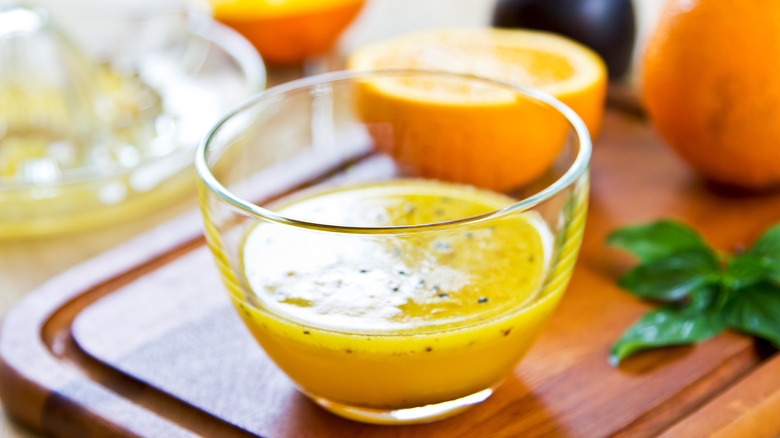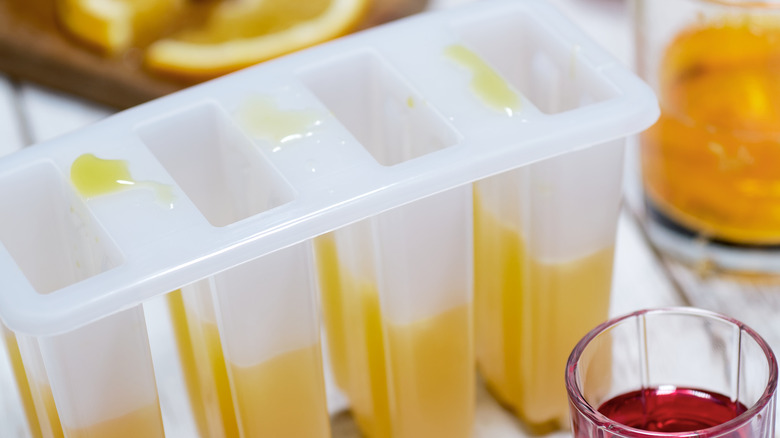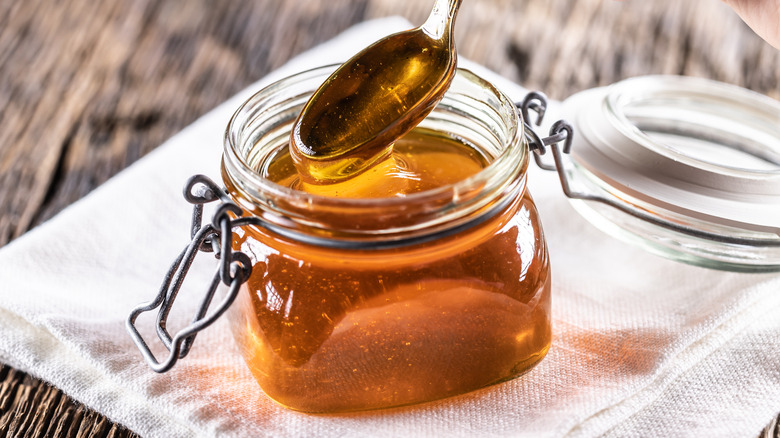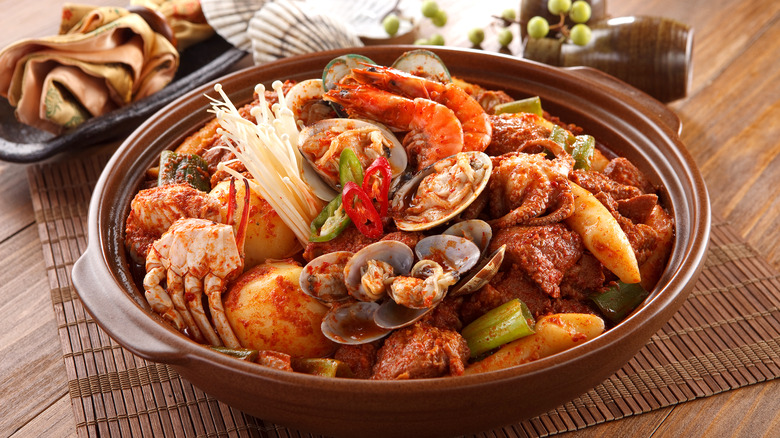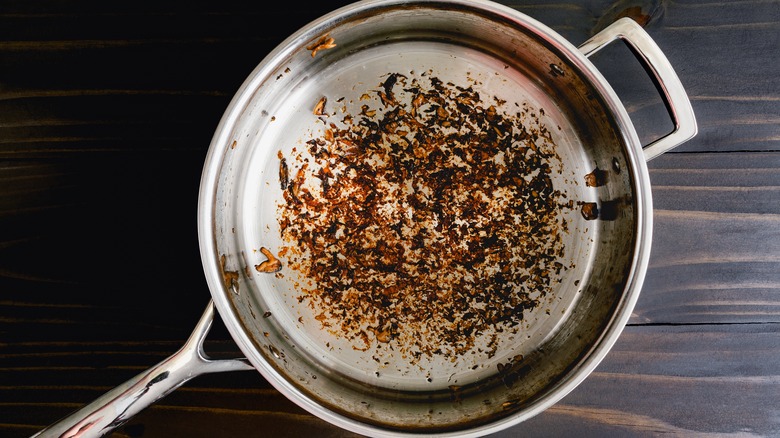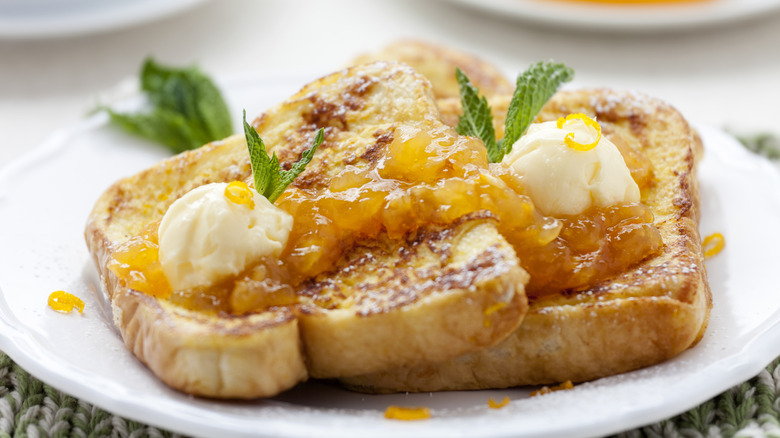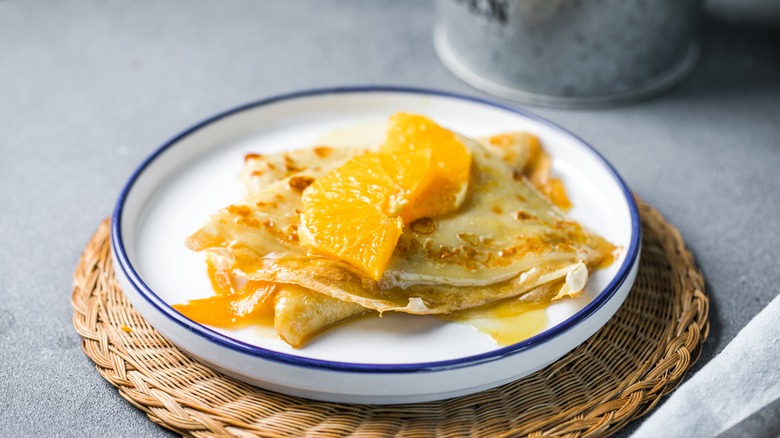12 Creative Ways To Use Orange Juice Besides Drinking It
Orange juice is commonly viewed as a refreshing yet humble breakfast drink, but its potential stretches far beyond the glass. Bursting with delectable sweetness and subtle acidity, it's unique and palatable flavor profile makes it a rather well-rounded ingredient — capable of elevating both sweet and savory dishes. Of course, despite this versatility, it can be hard to figure out ways to introduce orange juice into your expanded culinary repertoire.
To learn more about what foods orange juice works well with — and how to best use the beverage to maximize its flavor — we turned to an expert: Saiba Haque. A professional chef (with experience at several different establishments), recipe developer, and founder of Hot Source Magazine, Haque offered her insights on some of the vast array of uses for this kitchen staple.
From providing a pop of flavor to vinaigrettes to adding a citrusy brightness to stews, you're sure to discover some new and exciting ways to utilize orange juice thanks to Haque's recommendations. Whether you've got leftover juice sitting in a bottle or some fresh oranges ready to be squeezed, here are 12 creative ways to use orange juice beyond drinking it.
Use it to balance hot sauces
If you need to balance out the heat in your hot sauce, orange juice is a solid choice. The liquid can help mute the intensely spicy nature of certain peppers — such as Carolina reapers or scotch bonnet — making your sauce more palatable. While vinegar and honey may be more popular ingredients for countering excess heat, orange juice is perfectly suitable, as well.
Orange juice is an utterly tasty option that lends a fresh tanginess to hot sauces. It can "provide vibrant depth to your hot sauce or any spicy dishes" when you're looking to tone down the heat level, as Saiba Haque told us — which is great if you're eager to keep things light. Just keep in mind that orange juice brings a zesty component to hotter dishes, so you may need to adjust the quantities of your other ingredients to ensure the proper balance of flavors.
Haque also stated fermented hot sauces, in particular, benefit from the sweetness of orange juice. Of course, since the fermentation process yields natural acid, be sure to gradually incorporate orange juice into these types of hot sauces. Add the juice in increments, tasting it throughout until you reach your desired flavor profile.
Use it in a marinade
From pork chops to flank steaks, a juicy marinade can bring a new lease of life to any cut of meat by imbuing it with nuanced flavor and irresistible moisture. Unsurprisingly, then, orange juice proves itself to be a top choice as a marinade base. Its acidity makes it an excellent meat tenderizer, and there are numerous ways to utilize it; a splash of OJ makes a great steak tenderizer, for instance, while the secret to tender and balanced pork is orange juice.
Additionally, Saiba Haque mentioned orange juice (alongside other citrus counterparts) is often used to marinade meat in Mexican and Cuban cuisines. Dishes such as authentic carne asada and lechon asado (a Cuban dish of marinated roast pork) are defined, in part, by their orange juice-infused marinades, which produce truly flavorful and succulent meat. Plus, orange juice transforms into an irresistible, sweet and sticky coating while cooking.
"When roasted or seared, the orange juice marinade surrounding the cuts of meats caramelizes", Haque said. This results in an unctuous, sweet and tangy layer that pairs particularly well with rich, smoky meats like pork and beef. It also works beautifully as a glossy coating for fish, with the sharp citric taste complementing the natural brininess.
Make a citrus brine for poultry
In addition to serving as an excellent marinade base, orange juice can be used in wet brines, too. Unlike marinading (which is mainly concerned with imbuing ingredients with a particular flavor), brining is a process that helps meat maintain moisture during the cooking process. Sugar and citrus are both excellent additions to a brining liquid — the former aids in browning the meat, while the latter's acidity helps infuse deeper flavors – meaning orange juice is an undoubtedly great choice for your brine.
Beyond incorporating orange juice into a brine, Saiba Haque recommends adding orange zest, as well, to bring a subtle yet delicious flavor and further develop the aroma. Now, brining is especially useful for poultry, since it has a propensity to dry out. But if you're not interested in stuffing your turkey before roasting it, Haque suggests instead placing "some whole oranges (or halves) straight into the cavity of your poultry."
Since it's never too early to start planning for the fall holidays, be sure to add fresh oranges to your Thanksgiving shopping list. The fruit (and its juice) will help deliver an aromatic and succulent turkey that's sure to please everyone.
Add it to donut and fritter batters
It's no secret that the sweet and refreshing taste of oranges pairs nicely with baked goods. Orange juice, zest, and extract all prove to be excellent additions to lightly spiced bakes or moreish banana bread, where they lend a touch of freshness. Likewise, orange juice makes for a refreshing and tasty substitute for water in boxed cake mixes and can be used in batters for donuts and fritters, too.
The bright citrus flavor complements the sticky sweetness of a donut beautifully, while helping cut through the excessive richness for a slightly lighter feel. A splash of orange juice in apple fritter batters similarly harmonizes well with the preexisting fruity flavors. You can add orange juice into virtually any donut or fritter batter, though, and its flavor is unlikely to feel out of place.
Its taste also works well alongside flavors such as rich chocolate, or warming cinnamon and carrot. In fact, orange juice is the secret ingredient for making perfect carrot cake donuts. For a more aromatic orange flavor, you can even incorporate the juice into your glaze. This produces a glossy and tangy finish that elevates the flavor and appearance of your fried goods. To do so, simply combine 1 cup of powdered sugar with a few tablespoons of orange juice, then mix them together until the glaze is a drizzle-able consistency, adjusting quantities based on preference.
Turn it into a vinaigrette for salads or couscous
Orange juice is an optimal way to bring freshness to dishes in the warmer months. In that sense, orange juice can be made into a citrussy vinaigrette, which Saiba Haque told us is a wonderful option for brightening up salads or couscous. Its versatility means that it can be combined with numerous herbs, spices, and other ingredients to suit your specific culinary needs.
Some of the better complementary ingredients Haque highlighted include tarragon, parsley, Dijon or whole grain mustard, olive oil, and salt and pepper. More than that, if you happen to have fresh oranges on hand (as opposed to bottled orange juice), Haque provided a means to take this idea to the next level.
"I also highly suggest searing halves of whole oranges, flesh side down, until slightly caramelized and charred," Haque explained, "then juicing the orange to make your vinaigrette." Doing this will lead to an even more nuanced and complex flavor profile. The finished result brings a vibrant juiciness to fresh salads and fluffy couscous, with the sweet and smoky undertones giving your dish a whole new dimension.
Freeze them into popsicles
For a nutritious and delicious cooling treat, orange juice makes a truly terrific popsicle — and doesn't require any additional sugar or additives to prepare. Not only does this make orange juice-made popsicles a healthier option than many store-bought alternatives — you can control what goes in them, after all — but a low-cost and low-effort option, as well. For the simplest variation of this frozen treat, simply pour juice directly into an ice cube mold and leave it to set in the freezer.
Of course, you can drop an array of additional items into the mix, too, including chopped fruit, seasonal berries, or fresh herbs. But it doesn't stop there. You can also bring an adult twist to this nostalgic childhood treat with a splash of alcohol. This pineapple, cilantro, blackberry and vodka ice pop recipe provides some useful inspiration for how to put a mature spin on the classic snack. You can get creative in other ways, though, such as freezing orange juice and Champagne for a mimosa-inspired ice pop or adding some Aperol for a signature summertime taste.
Make a syrup for drinks and desserts
With the addition of just a few extra ingredients, you can completely transform orange juice into a sweet and glossy syrup — one that's ideal for drizzling over desserts or adding to your drinks. You can use an adapted simple sugar syrup recipe by swapping some of the water for juice before you mix in sugar and thicken it over heat. Using around ¼ cup of orange juice and ¾ cup of water for every cup of sugar should give you the right amount of orange flavor, but feel free to adjust these quantities based on your preference.
A syrup made like this will be fairly thin, which Saiba Haque mentioned is great for using in cocktails. However, if you're after a syrup that can be used to glaze cookies or be lathered on top of pancakes and waffles, simply add more sugar to the mix, and keep an eye on its consistency. You can also elevate your orange juice syrup by adding additional spices and flavorings.
Haque recommends whole cinnamon sticks, cardamom pods, cloves, and star anise for a sweet and spicy syrup with an irresistible warmth. Be sure to use any other orange discards you may have left over, too, including the peels. Adding orange peels into your syrup is a great way to ensure nothing gets wasted, while simultaneously contributing to the existing citrus flavors.
Add depth to stews and seafood boils
Thanks to its sweet and tangy flavor, orange juice is a key to achieving a perfectly balanced seafood boil. The liquid balances out the complexity of the spices and seasonings present, while contributing its own vibrancy for a distinctly fresh and zingy taste.
Saiba Haque affirmed this, telling Tasting Table that "citrus and seafood often go hand in hand." The acidity of the orange juice can help tenderize the seafood, leading to a more succulent texture, so it's not an ingredient you should omit. Of course, orange juice can be used to add depth to other types of stews and soups beyond seafood-based recipes.
Rich and hearty stews (such as those with red meat) are often elevated by a splash of orange juice, which can help cut through the richness. Meanwhile, soups with fresh and sweet flavors, like carrot and coriander, are granted extra vibrancy with the citrus beverage. After adding orange juice, allow your dish to simmer for a period of time to ensure the flavors properly meld together.
Make a Cuban sandwich
Orange juice has often been used alongside meat in Cuban cooking, as Saiba Haque mentioned, so it's no wonder that when Cuban immigrants began working in Florida, they carried the practice over with them. In fact, the beloved Cuban sandwich was created when these workers desired a tasty and satisfying (but still transportable) lunch. Now, the key to a top-notch Cuban sandwich is nailing the pork, and much of this comes down to a good marinade. In other words, don't be shy about using orange juice in the marinade mixture when preparing meat for this sandwich.
Citrus-marinated pork sets great meat apart from the good. Paired with spices such as cumin, paprika, and oregano, the slow-cooked pork is bursting with delectable flavors. The tender pork is served with mustard, pickles, and Swiss cheese on a Cuban sandwich loaf, and toasted until golden brown. Though the preparation time is by no means short, crafting a Cuban sandwich in this way is sure to yield impressive results (especially if you use our recipe to make the ultimate version).
Deglaze your pan with it
If you're unfamiliar with deglazing, it's essentially the process of adding liquid to a pan while it remains hot to bring forth the remnants stuck to the bottom during cooking. When you add a liquid and continue to heat things up, these valuable and flavor-packed scraps are lifted from the base and meld with the liquid to create a sauce that brings an extra dimension to existing dishes. You by no means want to skip this step when cooking, then, and orange juice is a good option to do so.
Saiba Haque noted orange juice will produce a bright sauce when used to deglaze a pan that can be used to garnish your dish. Thanks to its sweet taste, it can also be used as the base for a vast array of sauces and dishes, as well as contributing an appealing color — so don't let those scraps go to waste if you have orange juice to hand.
Orange juice is also a great choice for deglazing your pan when caramelizing onions. Caramelized onions have a sweet and slightly syrupy taste that's only elevated by the presence of similarly sweet citrus. Consequently, the two can be combined to create a truly indulgent caramelized onion jam.
Freshen up French toast
There are few breakfast or brunch dishes as indulgent as French toast, and part of its charm comes from its high customizability. There are seemingly countless ways to imbue further flavor into the dish with additional ingredients and toppings, and Saiba Haque pointed out orange juice is among those options.
Orange juice contributes sweetness whilst offering a sharp citric edge to this recipe. It can help cut through the richness of the custard-soaked bread and lead to a perfectly balanced and moreish plate. Even Martha Stewart believes orange juice brings a burst of flavor to French toast.
Simply add a splash of the juice (along with orange zest if you're using fresh fruit) to your egg, milk, sugar, and cinnamon mixture before you soak the bread to bring a subtly tangy orange flavor. Additionally, if you follow Haque's instructions to make an orange sugar syrup, you can use it to boost French toast, too. Simply drizzle it over your finished product for a little extra oomph that anyone will appreciate.
Make crepes Suzette with it
Crepes Suzette is a classic French pancake dish made with orange-infused butter. With this in mind, Saiba Haque believes this sweet treat is a fantastic option when you're looking to use orange juice to create a luxurious dessert or breakfast. Now, this recipe may sound complicated, but it's actually fairly easy to make. Plus, it doesn't require many ingredients: pancakes, orange juice, granulated sugar, and a little butter for cooking.
To make crepes Suzette, start by melting sugar in a pan over gentle heat until it caramelizes. Then, remove it from the heat before adding the orange juice, to be sure the juice doesn't split as it comes in contact with the hot sugar. Once everything is mixed together, drop in a little butter, then add the simple, thin pancakes to the pan.
As they warm, the pancakes will soak up all the buttery, sugary, and aromatic goodness to produce some of the best-tasting crepes you can imagine. These crepes Suzette are well suited to a drizzle of syrup on top, and if you have fresh oranges, an extra slice makes the perfect garnish. It not only tastes delicious but makes for a truly appealing and attractive plate.
